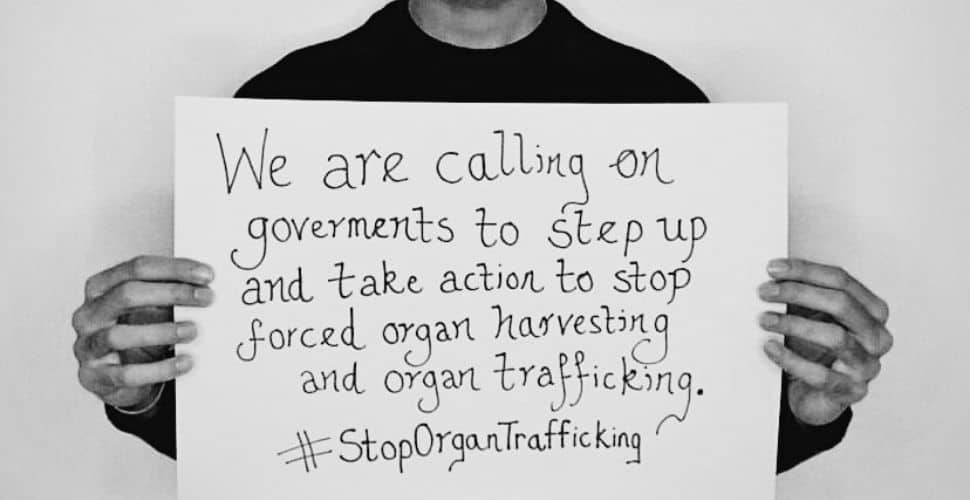Stop forced organ harvesting

Watch our webinar on tackling forced organ harvesting and organ trafficking.
Sign the petition! Read our letter to UN human rights experts here.
Did you know organs are being forcibly harvested from human beings?
It is shocking, but human trafficking for the purpose of organ removal and organ trafficking persist around the world, with primary victims being political prisoners, ethnic and religious minorities, and other vulnerable people. Organ trafficking hotspots include China, India, Pakistan, Turkey, Brazil, Nepal, the Philippines, Kosovo, Iran, and former Soviet states in eastern Europe.1
Alarmingly, globally only seven countries have passed legislation to combat these horrific crimes.2 Today, we demand more countries follow suit to stop forced organ harvesting and organ trafficking once and for all.
Forced organ harvesting and organ trafficking are interlinked crimes where organs are taken from victims through coercion or without informed consent and sold illegally, often making their way into the organ tourism transplant market. This means unknowing tourists undergoing organ transplants abroad are at-risk of receiving organs linked to organ trafficking and forced organ harvesting.
In many countries, impoverished people are targeted and coerced to sell an organ from which the traffickers make a significant profit. The ‘donor’ is left without medical care and with significant health risks.
In China, minorities rounded up by government crackdowns – political prisoners, ethnic Uyghurs3, and Falun Gong (Buddhist Qi Gong)4 practitioners — are known to be victims of forced organ harvesting. An international people’s tribunal in London recently found that some of China’s 1.5 million detainees in prisons camps have been killed for the state-sanctioned organ transplant trade worth over $1 billion.
“Forced organ harvesting has been committed for years throughout China on a significant scale,” said the China Tribunal,5 calling the crimes “of unmatched wickedness – on a death for death basis.”6
In 2012, China pledged to phase out harvesting organs from prisoners, but the international tribunal, researchers, and human rights activists stress that the practice continues to this day. An academic research analysis of organ donation data in China uncovered “highly compelling evidence [the numbers] are being falsified” and that tracking the sources of organs in the country remains difficult.7
Despite the clear evidence of organ trafficking and forced organ harvesting, ‘tourists’ continue to go abroad for organ transplants where the source of the organ cannot be verified. In fact, research suggests that 28% of organ transplants in China go to foreigners.8
Some governments are paying attention
But there are promising signs that governments around the world are waking up to this problem. South Korea, Belgium, Norway, Italy, Taiwan, Spain, and Israel have all passed legislation to combat forced organ harvesting, organ transplant tourism, and organ trafficking.9
Canada and the UK are now tabling similar bills that would criminalize the practice of receiving an organ transplant where informed consent was not given or recklessly obtained, prescribing harsh punishments for those who engage in the organ trafficking trade at home and abroad.1011
Organ transplants can save lives, but we believe that organs must be donated ethically and with complete transparency. Unfortunately, that is not the reality for many countries where organ trafficking occurs, and it’s high time for countries around the world to take a stand against organ transplant ‘tourism’ to these criminal hotspots.
You can take action!
Join our call, along with the International Coalition to End Transplant Abuse in China, in pushing countries around the globe to step up and tackle the often-overlooked crimes of human trafficking for the purpose of organ removal and organ trafficking.
Notes:
- https://www.aljazeera.com/indepth/features/2011/05/2011515153229450357.html ↩
- https://endtransplantabuse.org/legislation/ ↩
- https://uhrp.org/about ↩
- https://faluninfo.net/what-is-falun-gong-falun-dafa/ ↩
- www.chinatribunal.com ↩
- https://www.nbcnews.com/news/world/china-forcefully-harvests-organs-detainees-tribunal-concludes-n1018646 ↩
- https://www.theguardian.com/world/2019/nov/15/chinese-government-may-have-falsified-organ-donation-numbers-study-says ↩
- https://www.smh.com.au/lifestyle/health-and-wellness/crimes-against-humanity-is-china-killing-political-prisoners-for-their-organs-20191105-p537md.html ↩
- https://endtransplantabuse.org/legislation/ ↩
- https://www.parl.ca/DocumentViewer/en/43-1/bill/S-204/first-reading ↩
- https://www.theepochtimes.com/uk-parliament-discusses-bill-to-combat-organ-trafficking-and-transplant-tourism_3129135.html ↩
41,807
-
Christina T.
-
Arya U.
-
Sophia P.
-
Follow us on Facebook
5.6M
-
Follow us on Twitter
32K
-
Follow us on Instagram
8K
-
Subscribe to our Youtube
5.7K
Donate